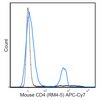Involvement of CD300a Phosphatidylserine Immunoreceptor in Aluminum Salt Adjuvant-Induced Th2 Responses.
Miki, H; Nakahashi-Oda, C; Sumida, T; Shibuya, A
J Immunol
194
5069-76
2015
Kivonat megmutatása
Aluminum salt (alum) has been widely used for vaccinations as an adjuvant. Alum not only enhances immunogenicity but also induces Th2 cell immune responses. However, the mechanisms of how alum enhances Th2 cell immune responses have been controversial. In an experimental allergic airway inflammation model, in which alum in conjunction with OVA Ag was i.p. injected for immunization, we found that apoptotic cells and inflammatory dendritic cells (iDC) expressing CD300a, an inhibitory immunoreceptor for phosphatidylserine (PS), significantly increased in number in the peritoneal cavity after the immunization. In contrast, apoptotic cells and iDCs were scarcely observed in the peritoneal cavity after injection of OVA alone. In CD300a-deficient mice, eosinophil infiltration in bronchoalveolar lavage fluid, serum IgE levels, and airway hyperreactivity were significantly decreased after immunization with alum plus OVA compared with wild-type mice. In vitro, iDCs purified from CD300a-deficient mice after the immunization induced significantly less IL-4 production from OT-II naive CD4(+) T cells after coculture with OVA Ag. CD300a expressed on iDCs bound PS on apoptotic cells in the peritoneal cavity after injection of OVA plus alum. Blocking CD300a interaction with PS by injection of a neutralizing anti-CD300a Ab resulted in inhibition of the development of allergic airway inflammation. These results suggest that CD300a is involved in alum-induced Th2 skewing. | 25911756
 |
Apoptotic cells suppress mast cell inflammatory responses via the CD300a immunoreceptor.
Nakahashi-Oda, C; Tahara-Hanaoka, S; Shoji, M; Okoshi, Y; Nakano-Yokomizo, T; Ohkohchi, N; Yasui, T; Kikutani, H; Honda, S; Shibuya, K; Nagata, S; Shibuya, A
J Exp Med
209
1493-503
2011
Kivonat megmutatása
When a cell undergoes apoptosis, phosphatidylserine (PS) is exposed on the outer leaflet of the plasma membrane. PS acts as an "eat-me" signal to direct phagocytes expressing PS receptors to engulf the apoptotic cell. We recently reported that the immunoreceptor CD300a, which is expressed on myeloid cells, is a PS receptor. We show that CD300a does not facilitate macrophage phagocytosis of apoptotic cells. Instead, CD300a delivers an inhibitory signal in mast cells to suppress production of LPS-induced inflammatory cytokines and chemokines. After cecal ligation and puncture (CLP), when a large number of cells undergo apoptosis in the peritoneal cavity, CD300a-deficient peritoneal mast cells produced more chemoattractant and recruited more neutrophils than did wild-type (WT) mast cells. As a result, CD300a-deficient mice showed increased neutrophil recruitment and improved bacterial clearance in the peritoneal cavity, and survived longer than WT mice. Antibody blockade of CD300a-PS interactions improved bacterial clearance and extended survival of WT mice subjected to CLP. These results indicated that CD300a is a nonphagocytic PS receptor that regulates mast cell inflammatory responses to microbial infections. | 22826299
 |








 Antibody[214208-ALL].jpg)
 Antibody[214208-ALL].jpg)








